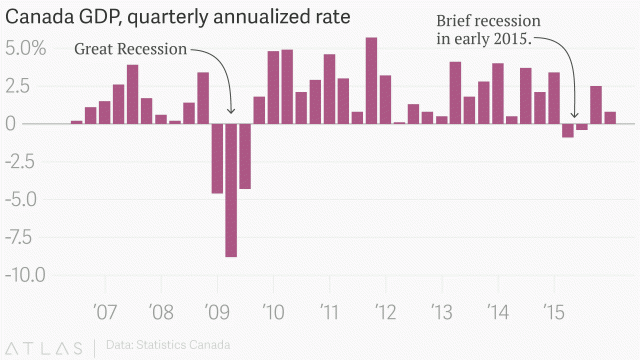Justin Trudeau’s Canada is the best hope for the global economy

I’ve tried to stay above the fray, when it comes to Canada’s new easy-on-the-eyes prime minister.
That’s been pretty easy—until now. Despite his political pedigree, commendable commitment to gender parity, and formidable core strength, Canada—while affluent and successful—usually isn’t a major force in global macroeconomics. But Justin Trudeau’s Liberal government is turning Canada into a testing ground for a kind of economic policy that the world now desperately needs.
Eight years after the financial crisis led to the worst economic downturn since the Great Depression, the global economy is sputtering. China is slowing and money is pouring out of the People’s Republic. Countries that counted on China’s endless appetite for iron, milk, copper, soybeans, metallurgical coal and, of course, oil, have seen their export revenues collapse.

In the rich world, central banks are bending over backwards to stoke growth with easy money, as policymakers from Switzerland to Japan and the European Central Bank in Frankfurt push interest rates into negative territory, upending the basic logic of financial markets. (During better times borrowers pay to borrow money, and lenders get paid to lend.)

Meanwhile, US corporate profits are shrinking. Investment is meh. And consumers are twitchy and unwilling (or unable) to engage in the kind of debt-fueled spending that puts the “boom” in boom times.

So where can the world turn to for growth? A Keynesian would advocate for fiscal policy, i.e. government spending.
Fiscally conservative global policymakers have long called for a relentless check on government spending, but now they’re changing their tune. In February, the IMF urged governments, those that had the capacity to do it at least, to take bold, coordinated, fiscal action to give the economy a lift.
On Friday (April 15), finance ministers from the G-20 recommitted, in theory, to using their budgets to bolster growth, though they didn’t make any promises of action.
“It certainly would be helpful to see fiscal policy play a larger role,” Fed chair Janet Yellen told attendees as part of a Q&A session after her recent speech to the Economic Club of New York.
Canada is about to find out whether that’s true.
Brought to power as part of a landslide Liberal wave in Canada’s Parliament, Prime Minister Trudeau’s government has outlined an ambitious spending push aimed at keeping Canada clear of the economic pain now being felt by other large commodities exporters.
Introduced last month, his government’s first budget plans for the country to run a deficit of more than $29 billion Canadian dollars (US $22.6 billion), compared to last year’s C$5.4 billion. Federal spending is forecast to rise from 13.6% last fiscal year to 14.6% of GDP this fiscal year. The centerpiece of the push is an C$11.9 billion infrastructure overhaul that includes spending on everything from public transit, water and wastewater to affordable housing and childcare facilities.
Canada’s decisive shift to deficit spending to stave off recession is the right move. The country’s growth has been sputtering for the last year, amid a sharp decline in petroleum export revenues.

But Canada’s decision to boost spending could also serve as an example to other affluent nations such as the US and Germany, where interest rates are incredibly low and countries have the ability to make investments that will not only give the economy a short-term boost, but also enhance the long-term productivity of the economies. Unfortunately, there’s little indication that rich nations countries are willing to use the power of the budget to reinforce growth.
“Fiscal policy .. seems to be out of bounds in all major economies,” ECB Vice President Vítor Constâncio noted in recent speech. “In the euro area, fiscal policy is strictly conditioned by the legislation of the Stability and Growth Pact and in the US, it is seemingly blocked by political partisanship. Apparently, only if the state of the world economy deteriorated considerably, would governments step up the use of all the tools at their disposal.”
This is a shame. Canada is showing the world what responsible deficit spending looks like. Moody’s analysts said Canada’s larger deficits included in the budgets would do nothing to threaten Canada’s AAA credit rating. Analysts at the credit rating agency also noted that “the deficits are still small by global standards and projected to decline over the medium term.”
Canada’s bullet proof credit rating is largely due to the efforts of the previous government of Conservative Stephen Harper, who sensibly reined in deficits in recent years as Canada continued to benefit from the commodities export boom. After running large deficits during the Great Recession, Canada slowly returned to a budget surplus, in effect giving Trudeau the dry powder he needs to try to add some pep to growth now.

And by the way, this is precisely the way Keynesian economic policy is supposed to work. The man himself famously wrote in 1937 that “the boom, not the slump, is the right time for austerity at the Treasury.”
True, it took a change of government to execute that Keynesian game plan in Canada. But as is Canada’s wont, the country is quietly and sensibly doing the right thing.
How sad that few other countries are.
Clarification: Justin Trudeau is Canada’s prime minister, a previous version of this post referred to him as the premier. While premier is a synonym for prime minister, in Canada premier refers to provincial premiers.

Sign up for the Quartz Daily Brief, our free daily newsletter with the world’s most important and interesting news.
More stories from Quartz:

 Yahoo Finance
Yahoo Finance 